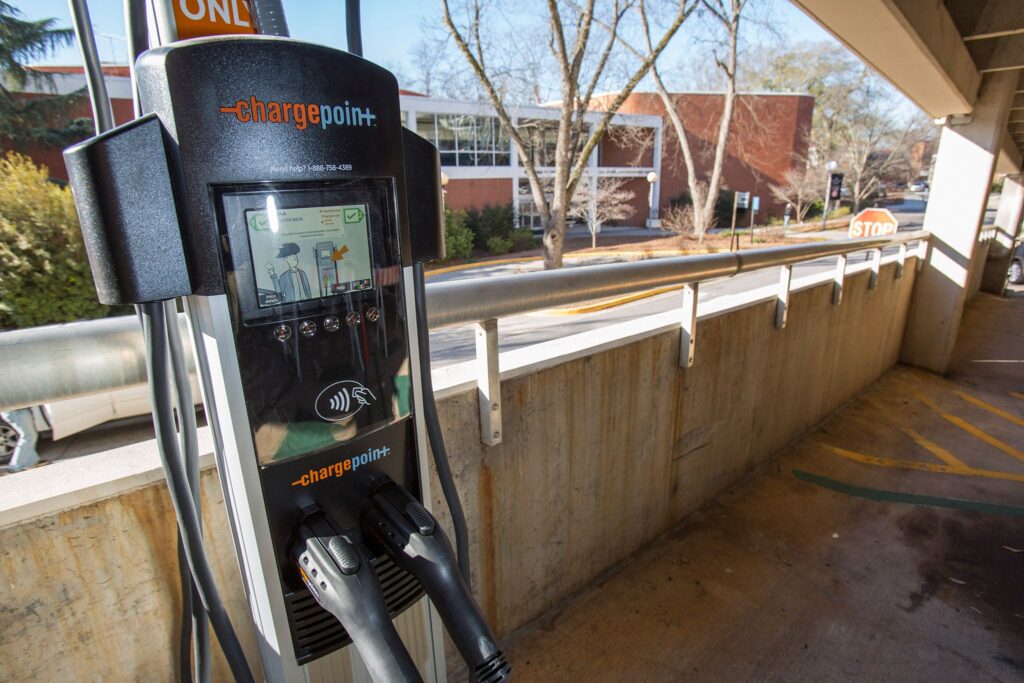The University of Georgia announced a campus-wide Electric Mobility Initiative in January, with the goal of enhancing research, education and outreach opportunities in the high-growth, high-tech commercial sector.
Electric mobility refers to vehicles such as cars, trucks, bicycles, boats and aircraft that use electric powertrain technologies for propulsion. The market size of electric mobility has grown dramatically in recent years with the development of smart infrastructure, wireless communications, and most importantly, efficient energy storage technology such as high-capacity batteries.
UGA’s initiative will bring industry leaders and scholars to campus to discuss innovative approaches to electric mobility across Georgia and provide seed funding for new research projects. Faculty at the Terry College of Business plan to examine the economic, human and natural capital impacts of scaling electric mobility and its effects on sustainable development goals.
“Developments in battery technology, the growth in electric vehicle sales, and the transition to renewable energy are a trifecta for significant societal and economic change delivered by higher levels of energy efficiency and cheaper electricity,” said Regents Professor Richard Watson, a Terry College faculty leader working on the campus-wide initiative. “UGA is poised to help Georgia switch on a new future.”
Watson noted the economic development momentum that’s building in close proximity to the university. Rivian, the startup EV maker, revealed in December that its second U.S. plant will be located in Morgan and Walton counties, along Interstate 20 east of Atlanta. And SK Innovation’s lithium-ion battery manufacturing facility is rising out of the ground in the city of Commerce, along Interstate 85 northeast of Atlanta.
“With the SK battery factory, the Rivian plant, and plentiful sunshine, Georgia has much to gain and more to offer,” he said. “SK and Rivian are linked by Highway 441, with the University of Georgia sitting at the midpoint. We are ideally located to cooperate with industry to advance these critical developments through our research and educational expertise.”
UGA will invest $1 million in seed funding over the next five years to initiate new projects, including the development of educational programs such as the E-Mobility Certificate and research activities in battery re-use and recycling, including the creation of a laboratory that will be housed in the new Interdisciplinary STEM Research Complex. Private support has already been obtained for faculty development, student projects and efforts to enhance the health and resilience of vulnerable communities.
“This initiative will span our entire campus and allow for all academic units to contribute to this exciting, developing tech space,” said S. Jack Hu, the university’s senior vice president for academic affairs and provost.
Four academic units at UGA form the initial partnership in the Electric Mobility Initiative. In addition to the Terry College, the other units are:
- The College of Engineering, which will assess the opportunities and challenges associated with advanced electric energy technology, smart infrastructure and interconnected communications on the integrated transportation network.
- The School of Public and International Affairs, which will explore energy security, regulation and public financing of electric mobility.
- The Carl Vinson Institute of Government, which will use its extensive statewide network to understand how EV technology will impact communities in Georgia and enhance the economic competitiveness of the state.
An Electric Mobility Summit is planned for April 28-29 on the UGA campus to bring together industry, educational institutions and government agencies to assess the state of electric mobility in Georgia and the region. Participants will discuss educational programs to support workforce development and assess the economic impact of electric transportation technologies in communities across Georgia.

